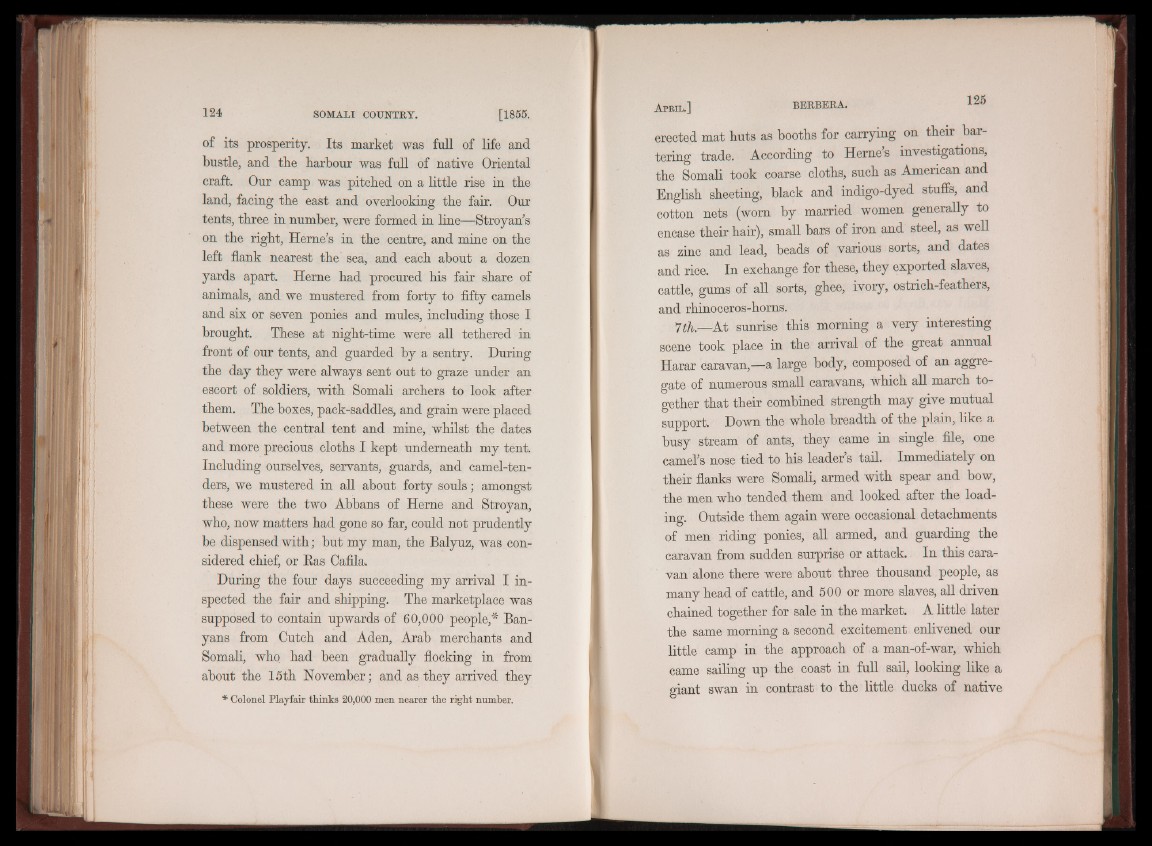
of its prosperity. Its market was full of life and
bustle, and the harbour was full of native Oriental
craft. Our camp was pitched on a little rise in the
land, facing the east and overlooking the fair. Our
tents, three in number, were formed in line—Stroyan’s
on the right, Herne’s in the centre, and mine on the
left flank nearest the’ sea, and each about a dozen
yards apart. Heme had procured his fair share of
animals, and we mustered from forty to fifty camels
and six or seven ponies and mules, including those I
brought. These at night-time were all tethered in
front of our tents, and guarded by a sentry. During
the day they were always sent out to graze under an
escort of soldiers, with Somali archers to look after
them. The boxes, pack-saddles, and grain were placed
between the central tent and mine, whilst the dates
and more precious cloths I kept underneath my tent.
Including ourselves, servants, guards, and camel-ten-
ders, we mustered in all about forty souls; amongst
these were the two Abbans of Heme and Stroyan,
who, now matters had gone so far, could not prudently
be dispensed with; but my man, the Balyuz, was considered
chief, or Has Cafila.
During the four days succeeding my arrival I inspected
the fair and shipping. The marketplace was
supposed to contain upwards of 60,000 people,* Banyans
from Cutch and Aden, Arab merchants and
Somali, who had been gradually flocking in from
about the 15th November; and as they arrived they
* Colonel Playfair thinks 20,000 men nearer the right number.
erected mat huts as booths for carrying on their bartering
trade. According to Heme’s investigations,
the Somali took coarse cloths, such as American and
English sheeting, black and indigo-dyed stuffs, and
cotton nets (worn by married women generally to
encase their hair), small bars of iron and steel, as well
as zinc and lead, beads of various sorts, and dates
and rice. In exchange for these, they exported slaves,
cattle, gums of all sorts, ghee, ivory, ostrich-feathers,
and rhinoceros-homs.
7th.—At sunrise this morning a very interesting
scene took place in the arrival of the great annual
Harar caravan,—a large body, composed of an aggregate
of numerous small caravans, which all march together
that their combined strength may give mutual
support. Down the whole breadth of the plain, like a
busy stream of ants, they came in single file, one
camel’s nose tied to his leader’s tail. Immediately on
their flanks were Somali, armed with spear and bow,
the men who tended them and looked after the loading.
Outside them again were occasional detachments
of men riding ponies, all armed, and guarding the
caravan from sudden surprise or attack. In this caravan
alone there were about three thousand people, as
many head of cattle, and 500 or more slaves, all driven
chained together for sale in the market. A little later
the same morning a second excitement enlivened our
little camp in the approach of a man-of-war, which
came sailing up the coast in full sail, looking like a
gia n t swan in contrast to the little ducks of native